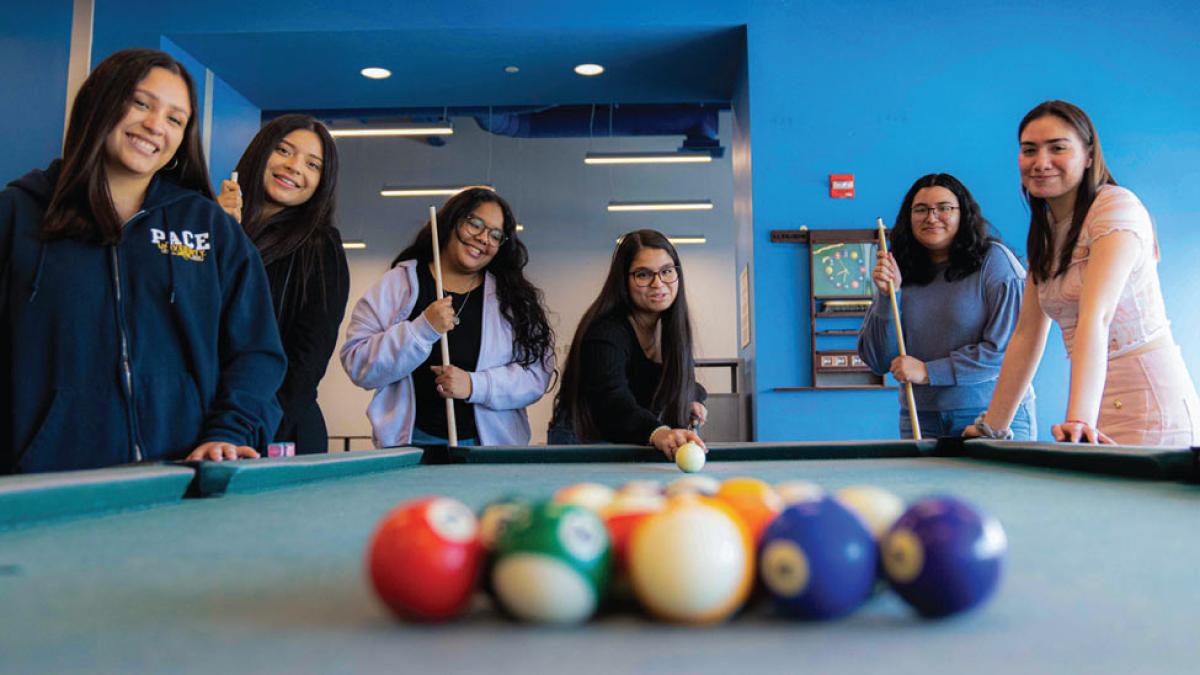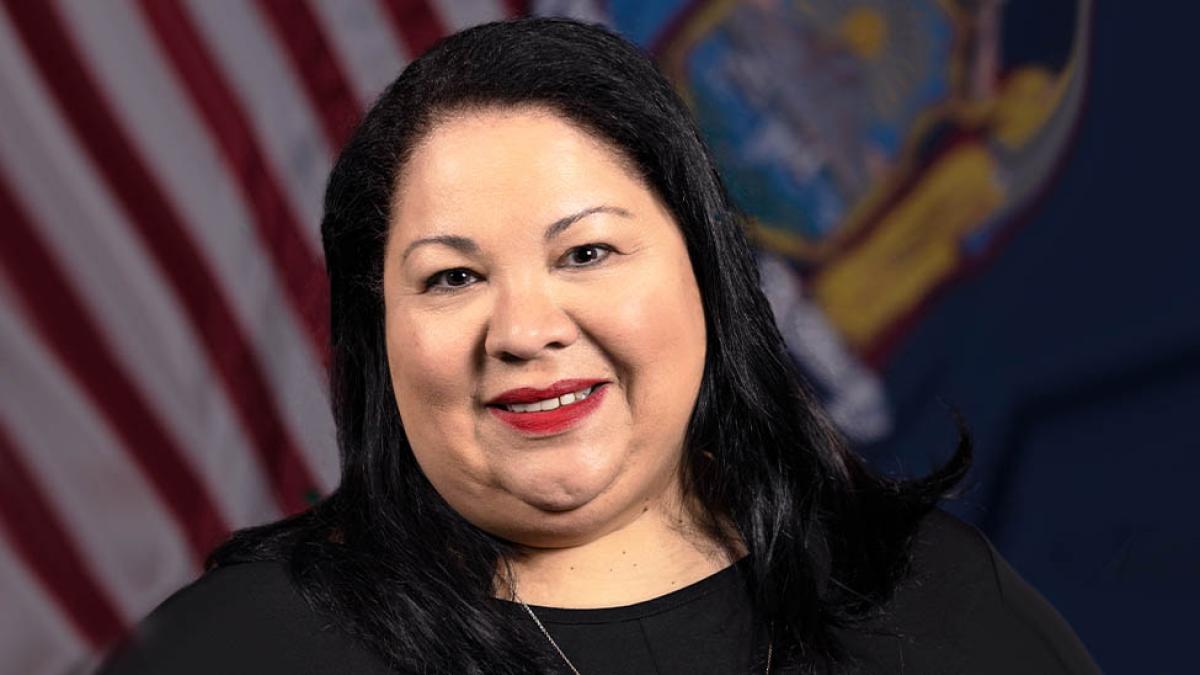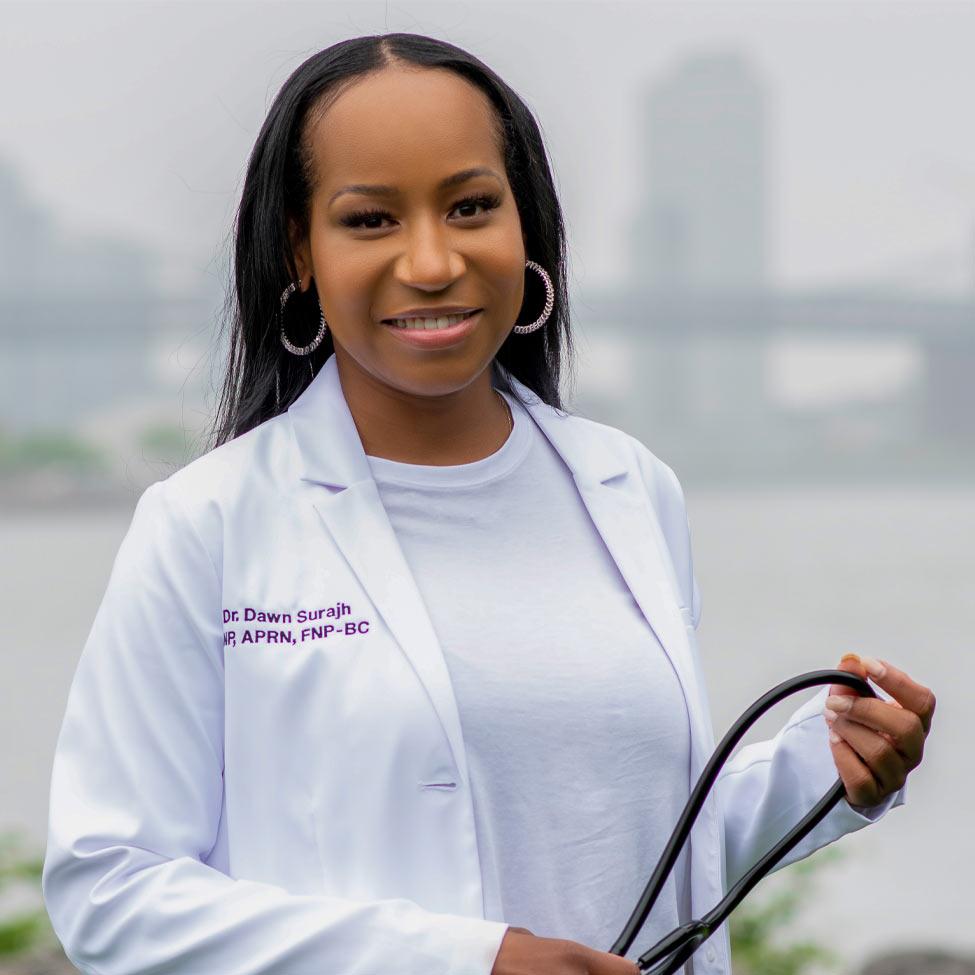
The Beauty is in the Eye of the #Go-Getter
There is a saying that beauty is in the eye of the beholder and according to Dawn, beauty is also expressive. Aesthetics has allowed her to make others’ dreams come true, and to her that is an art.


Pace Go-Getters can do it all, said Pace two-time graduate, mother, wife, nurse, and business owner, Dr. Dawn Surajh, DNP, APRN, FNP-C. For Dawn, nursing is not just a passion, it is her foundation.
As an alumna from the Leinhard School of Nursing (LSN) Family Nurse Practitioner (FNP) program and Online Accelerated Doctor of Nursing Practice (DNP) program, Dawn took her nursing career to the next level and opened her own nursing aesthetics practice, D’s Aesthetik Inc., in Georgia.
There is a saying that beauty is in the eye of the beholder and according to Dawn, beauty is also expressive. Aesthetics has allowed her to make others’ dreams come true, and to her that is an art. She uses her artistic skills along with her medical professionalism to treat patients with care and expertise. “Diving into the beauty industry has been nothing but rewarding for me as a cosmetic injector because I get to witness the happy side of patients and the medical field. I see delight from patients when they view their results produced from these magical hands of mine,” said Dawn. She strongly believes in following the mantra, “inject with intent!” guiding her to operate her practice with honesty.
Opening an aesthetic practice takes a lot of patience and trial and error. She was never presented with a blueprint about opening any practice; but felt confident in her Pace education and well accomplished at the end of each degree. “The quality of education and training experience I received at Pace were nothing short of amazing,” she said. Starting her own business came with challenges, but as her passion and dream, Dawn did not consider this as work. “It takes a lot of hard work, dedication, blood, sweat, tears, and determination to be successful. My biggest take away was to never give up on your dream,” she explained.
“The quality of education and training experience I received at Pace were nothing short of amazing."
—Dr. Dawn Surajh
Dawn chose Georgia as a location for a better family environment for her children. She continues to be dedicated to working on her art of injecting and making clients feel wanted, beautiful and fulfilled. As a business owner, it is not about the money for Dawn, but the rewards behind each procedure from a client standpoint. “If my clients are happy at the end of their treatment, it’s evident that I have done my job and have done it well,” said Dawn. The most rewarding part of her day is making her clients smile at the end of their treatment with the “wow” effect as she hands them the mirror.
More from pace
Pace's faculty are working across disciplines to address the health needs of today.
Our innovative new programs in human centered design, health informatics, and more are ensuring that today’s Pace students will be tomorrow’s leaders in emerging industries.
With the help of a nearly $2M federal grant, this inaugural cohort of nursing students is poised to change the face of patient care.
Professor Leslie Tenzer to host new podcast on West Academic, Legal Tenzer: Casual Conversations on Noteworthy Legal Topics
Elisabeth Haub School of Law at Pace University Professor Leslie Y. Garfield Tenzer is the host of a newly launched podcast, Legal Tenzer: Casual Conversations on Noteworthy Legal Topics. Created in collaboration with West Academic, Legal Tenzer, will serve as a platform for casual conversations on timely legal issues between Professor Tenzer and prominent legal scholars and practitioners.
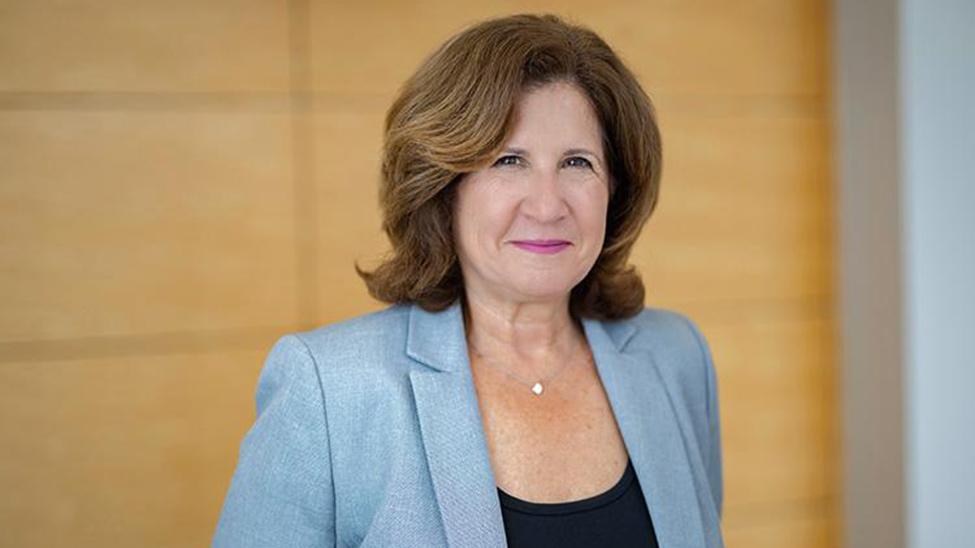
Elisabeth Haub School of Law at Pace University Professor Leslie Y. Garfield Tenzer is the host of a newly launched podcast, Legal Tenzer: Casual Conversations on Noteworthy Legal Topics. Created in collaboration with West Academic, Legal Tenzer, will serve as a platform for casual conversations on timely legal issues between Professor Tenzer and prominent legal scholars and practitioners.
"I am so thrilled to be the host of this newly launched podcast by West Academic," said Professor Tenzer, Professor of Law and Luk-Cummings Family Faculty Scholar at the Elisabeth Haub School of Law. "Podcasts have become another learning medium and tool for students and the broader legal community. Throughout this podcast, we will discuss hot topics and timely legal cases, issues, and topics. I look forward to having these interesting casual conversations with West Academic authors and sharing the knowledge through the podcast platform."
The first episode, The Pink Tax, featured Elisabeth Haub School of Law Distinguished Professor Bridget Crawford, speaking with Professor Tenzer on the topic of menstrual equality. Upcoming episodes, released weekly, will focus on topics including the Vanessa Bryant privacy case, and the West Virginia v. EPA decision, featuring Haub Distinguished Professor of Environmental Law Katrina Fischer Kuh.
The new podcast series draws upon the success of Professor Tenzer's widely acclaimed podcast for students, Law to Fact, which was launched in 2017. In Law to Fact, Professor Tenzer highlights substantive legal issues in discussion with distinguished law professors from across the nation. Over time the renowned podcast has become the go to place for all things law, including course material, application tips, study strategies, and career advice—all packed into one podcast.
Professor Tenzer's scholarship and teaching bridge the worlds of theory and practice, mainly regulating conduct in the digital age. Before coming to Pace, Professor Tenzer was a legislative attorney in the Legal Division of the Council of the City of New York. Her responsibilities included drafting legislation, organizing public hearings, and coordinating with city agencies and interest groups on the city's legislative process. She currently teaches and writes in Commercial Law, including Contracts and UCC Article 2, Criminal Law, Torts, and Social Media Law. Professor Tenzer's most recent scholarship focuses on issues concerning emotional harm and the impact of the Internet on the law. She received her BA from the University of Florida and her JD from the University of Florida College of Law.
Each episode ofLegal Tenzer: Casual Conversations on Noteworthy Legal Topics is available online to the public for one week upon release or through a subscription to West Academic.
If Trump Takes the Fifth, Is He Guilty?
Donald Trump and his family were ordered to testify in the New York Attorney General’s investigation into allegations of fraudulent financial conduct by Trump and the Trump Organization. Although Trump and his children will appear for their depositions, don’t expect them to say anything. The smart money is that they will assert the Fifth Amendment and refuse to answer any substantive questions.
Fundraising: An Important And Fulfilling Career
The lingering pandemic transformed the American labor market. Employers from fast-food restaurants to airlines to rec departments with swimming pools are confronting sometimes-crippling staffing shortages. The most recent employment numbers showed 11.3 million job openings nationwide, or nearly two open jobs for every unemployed worker.
We Must Invest in College Students' Mental Health
We are facing a mental health crisis on campuses across the country. And at a time when it often can feel like the federal government is too divided to address any of the many other problems facing us, Congress is actually taking steps to address this crisis.
Understanding Monkeypox
As the monkeypox virus continues to spread in the US, here's what you need to know—what it is, how it spreads, symptoms, treatment and vaccines, and how to prevent it from affecting you.


The Centers for Disease Control and Prevention (CDC) is tracking an outbreak of monkeypox that has spread across several countries that don’t normally report monkeypox, including the United States.
- The monkeypox virus is spreading mostly through close, intimate contact with someone who has monkeypox.
- You can take steps to prevent getting monkeypox and lower your risk during sex.
- CDC recommends vaccination for people who have been exposed to monkeypox and people who are at higher risk of being exposed to monkeypox.
- If you have any symptoms of monkeypox, talk to your healthcare provider, even if you don’t think you had contact with someone who has monkeypox.
What is monkeypox?
Monkeypox is a rare disease caused by infection with the monkeypox virus. Monkeypox virus is part of the same family of viruses as variola virus, the virus that causes smallpox. Monkeypox symptoms are similar to smallpox symptoms, but milder, and monkeypox is rarely fatal. Monkeypox is not related to chickenpox.
How does Monkeypox spread
Monkeypox spreads in different ways. The virus can spread from person-to-person through:
- direct contact with the infectious rash, scabs, or body fluids
- respiratory secretions during prolonged, face-to-face contact, or during intimate physical contact, such as kissing, cuddling, or sex
- touching items (such as clothing or linens) that previously touched the infectious rash or body fluids
- pregnant people can spread the virus to their fetus through the placenta
It’s also possible for people to get monkeypox from infected animals, either by being scratched or bitten by the animal or by preparing or eating meat or using products from an infected animal.
Learn more about monkeypox transmission.
Symptoms of monkeypox can include:
- Fever
- Headache
- Muscle aches and backache
- Swollen lymph nodes
- Chills
- Exhaustion
- A rash that can look like pimples or blisters that appears on the face, inside the mouth, and on other parts of the body, like the hands, feet, chest, genitals, or anus. The rash goes through different stages before healing completely. The illness typically lasts 2-4 weeks. Sometimes, people get a rash first, followed by other symptoms. Others only experience a rash.
Learn more about symptoms.
Treatment for and Vaccination Against Monkeypox
Treatment for Monkeypox:
There are no treatments specifically for monkeypox virus infections. However, monkeypox and smallpox viruses are genetically similar, which means that antiviral drugs and vaccines developed to protect against smallpox may be used to prevent and treat monkeypox virus infections. Antivirals, such as tecovirimat (TPOXX), may be recommended for people who are more likely to get severely ill, like patients with weakened immune systems.
Vaccination Against Monkeypox:
When properly administered before or after a recent exposure, vaccines can be effective tools at protecting people against monkeypox illness.
- Two vaccines licensed by the US Food and Drug Administration (FDA) are available for preventing monkeypox infection—JYNNEOS (also known as Imvamune or Imvanex) and ACAM2000.
- In the United States, there is currently a limited supply of JYNNEOS, although more is expected in coming weeks and months.
Learn more about monkeypox vaccines and find out where you can get vaccinated in New York.
Preventing Monkeypox
Take the following steps to prevent getting monkeypox:
- Avoid close, skin-to-skin contact with people who have a rash that looks like monkeypox.
- Do not touch the rash or scabs of a person with monkeypox.
- Do not kiss, hug, cuddle or have sex with someone with monkeypox.
- Do not share eating utensils or cups with a person with monkeypox.
- Do not handle or touch the bedding, towels, or clothing of a person with monkeypox.
- Wash your hands often with soap and water or use an alcohol-based hand sanitizer.
Read more prevention strategies.
The Marketing Executive with an Eye for Art
Marketing executive and alumnus Richard Bourque '00 draws inspiration for his creative process from his Art History degree, strong work ethic, and desire to make positive progress in the world.
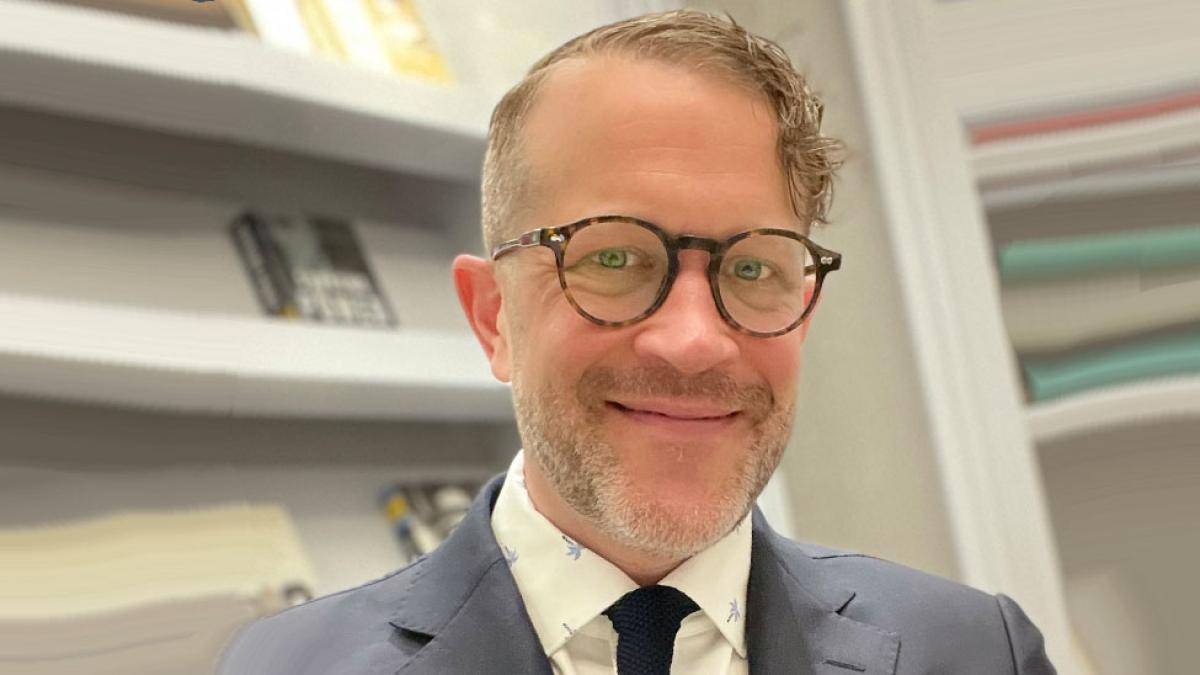
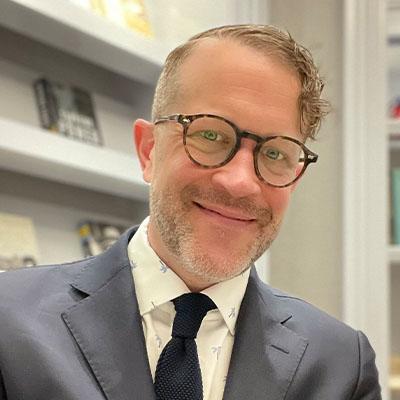
Marketing executive and alumnus Richard Bourque draws inspiration for his creative process from his Art History degree, strong work ethic, and desire to make positive progress in the world.
You have had a highly successful career in marketing, spanning the areas of art, fashion, music, business-to-consumer (B2C), business-to-business (B2B), and, most recently, in education, first as vice president at Scholastic, and currently, chief marketing officer at Educational Epiphany.
What aspects of your professional life are you most proud of and why?
I am most proud of the fact that I created my own path and focused on the things that made me happy – which at many points in my journey felt challenging in many, many ways. However, I was willing to make that decision, work as hard as I could, and stay positive. I did not want to take traditional business classes; I loved to write and be creative, and I loved being in New York City. I was, and still am, passionate about art, architecture, food, photography, anything that involves the creative process.
As for my work in education, it’s the perfect industry for me because I can feed my passion for helping people and doing something that I know has a positive impact on society and the world at large. When I visit schools in 40+ states and internationally, I always leave feeling inspired and more knowledgeable about how we can help progress happen.
Is equity in education something you are passionate about?
Absolutely! Equity and access are critical to helping students become the thought leaders and innovators of tomorrow. If we do not provide access to ALL students – regardless of race, gender, ethnicity, zip code, or learning ability – then we are not doing our jobs as educators. Kids can do anything if we show them what’s possible and no matter what challenges they face. We can help just by providing them access.
You received a Bachelor of Arts in Art History from Pace University. What attracted you to pursue this course of study and how did you get started in your career?
I love art and I love to read. I also discovered a profound sense of inspiration from the energy associated with what art and artists bring to the world; there’s a sense of urgency, beauty, and excitement. Plus, being in New York, I would spend hours at the Metropolitan Museum of Art and Museum of Modern Art reading and learning. Whatever it is that excites you, you should do whatever you have to do to follow it and be closer to it!
Through Career Services at Pace, I obtained an internship at a famous gallery in SoHo named Artists Space. Through that internship, I met the team at Interview magazine. (Back in those pre-internet days, I always had a copy of my resume in my backpack. I would walk the streets of SoHo and drop it off in as many places as would let me). I got an interview – at Interview – and never looked back.
In your view, what meaning does the study of art of the past have to society?
Wow, this is a great question! In my opinion, the impact of the history of art is far and wide. It reaches every corner of the world and in every society. Artists have shaped many of the buildings we work and live in, created the vehicles and transportation systems we use, and have covered the sides and walls of the buildings we work and live in. So, the art of the past has a profound impact and influence on how we all live today.
That willingness to try, that willingness to work hard, to discover new things and put yourself out there, that’s what drives people like me, like us.
How has a degree in Art History prepared you for your career in marketing? Do you have any thoughts about the value of a liberal arts education?
Marketing is about learning. If you are not learning, you are not relevant in the marketing field. You must stay ahead of your customers and understand them and their buying patterns. My degree in Art History provided me with a different way of approaching situations and challenges at work. I was always able to come up with a good idea to support a sales team, to write messaging for a campaign, and to approach data in a unique way. This helped me stand out and get the attention of my managers over time.
I believe a liberal arts education has so much value when it comes to thinking outside of the box and solving problems in your career. Oftentimes in business, at least in my experience, there is often a need for a creative solution to a problem. If you can do this, and learn how to be proactive and hardworking, you can be successful.
Why did you choose to enroll at Pace University on the New York City campus?
I really wanted to be in New York, and I wanted to be at a school where I knew my classes would be smaller. I also liked the option of being in Pleasantville and/or the New York City campus.
Were there certain faculty who were instrumental in your academic and/or professional journey?
Professor Lisa Farber for sure. She is the person who influenced me the most, who pushed me to do my best, and who encouraged me to think differently. She taught about the value of hard work and how to navigate some of the challenges associated with being in a big city and entering such competitive fields as art and publishing.
College is a momentous time in a person’s life. As you look back at your time as a Dyson student, how did it influence you to become the person you are today?
My time at Dyson had a profound impact on my life. I met so many amazing friends and people, made connections, and learned so much from my professors. Being in the city is hard when you are 20 years old. I had three jobs and went to school like many of my friends. However, that willingness to try, that willingness to work hard, to discover new things and put yourself out there, that is what drives people like me, like us. We all had goals, and we did everything we could together as a group to achieve them.
What challenges, if any, have you faced along the way and how did you overcome them?
I face challenges in life and in work just like everyone does. I had folks around me with MBAs and business degrees that did not take me seriously many times, and I had to work hard to gain their respect. I got turned down for a lot of marketing jobs, but that just made me be more grateful and focus on whatever jobs I did get. I learned about the teams in cross-functional departments, I went out of my way to build relationships with internal and external partners, and I knew how lucky I was to get these opportunities, so I did not take them for granted. You are always going to have people that talk about you, that judge you for whatever reason; but if you remain focused on what really matters and focused on your goals and what is good for you and your family, then good things will come.
What advice would you give to our students, as they navigate their college life?
Do you! I know this sounds cliché, but I am telling you there is a place for you – for all of us – in this world, and you are unique and talented in your own way. Make friends, network, put yourself out there, and stay focused. Work as hard and as smart as you know how. And step out of your comfort zone; that’s when the magic happens, when you meet new people, discover, and learn new perspectives, and you will find that “thing” or that “idea” that will shape your bright future! You got this!
More Dyson Alumni
“Pace allowed me the space and grace to form my own distinct value system, while expanding my knowledge of scholarly political theories and feminist texts to prepare me for my career.”
From award-winning journalist, to first female editor-in-chief, CEO, and publisher of the nation’s largest Spanish language newspaper, to New York State Secretary of State, Commissioner Rossana Rosado is inspired by the stories of others.
A scrappy, working-class kid with big dreams manages to make it big in Hollywood with the help of some special mentors.
Tips from a Lubin Graduate Who Passed the CPA Exam and Landed a Big Four Job
After graduating from Pace University in the spring, Public Accounting graduate Maria Savino '22 learned she passed the final part of the Certified Public Accountant (CPA) Exam. In the fall, she'll join the team at KPMG, a Big Four accounting firm.

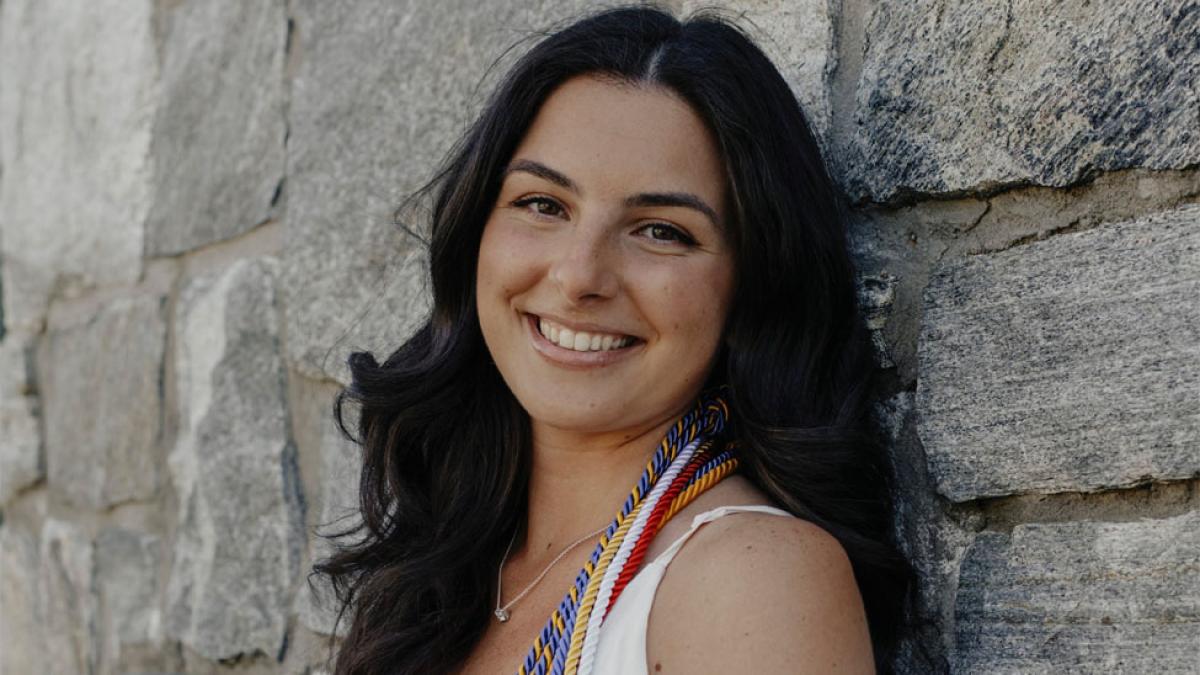
Maria Savino
Audit Associate, KPMG
Class of 2022
BBA/MBA in Public Accounting
Hometown: Long Island, NY
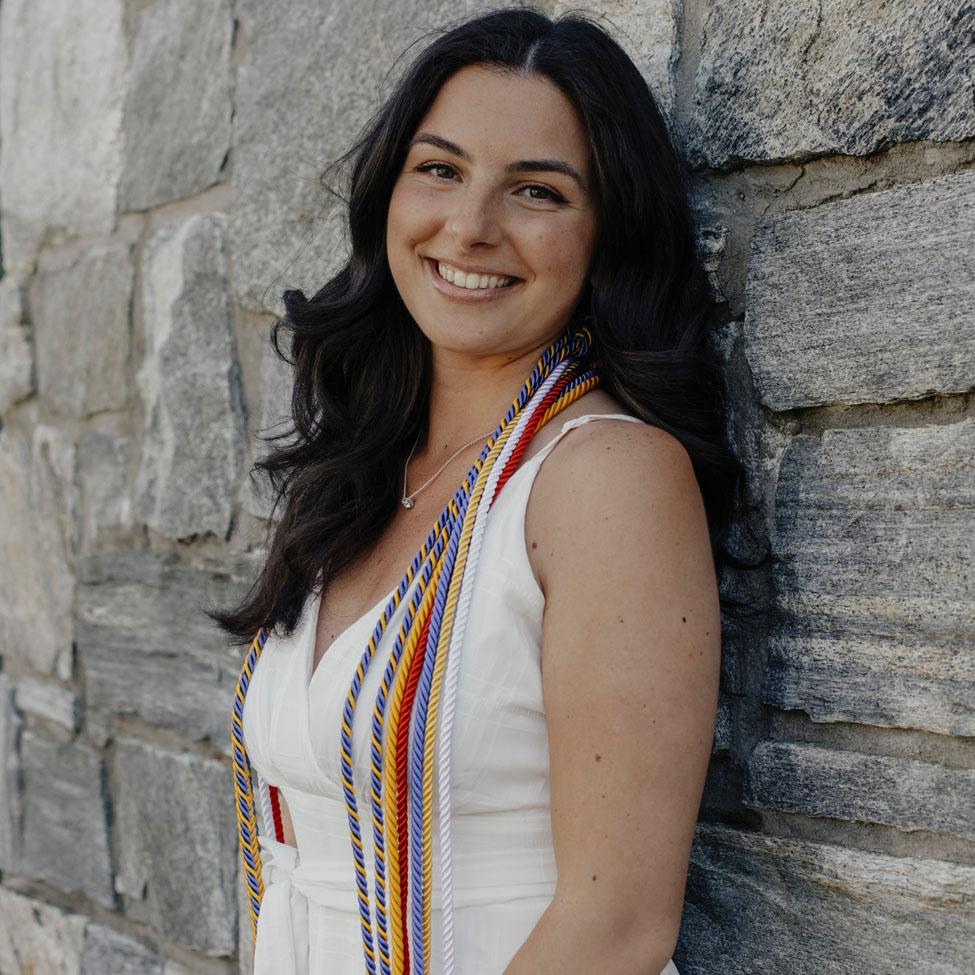
After graduating from Pace University in the spring, Public Accounting graduate Maria Savino '22 learned she passed the final part of the Certified Public Accountant (CPA) Exam. In the fall, she'll join the team at KPMG, a Big Four accounting firm. She's now sharing her tips for success for other Lubin School of Business students looking to make a similar journey.
Why did you choose Pace University and the Lubin School of Business?
I chose Pace University because of its accredited accounting program, prime location, and the opportunities available for students. I liked the smaller classroom setting, and the Pleasantville campus has the traditional campus feel I was looking for.
What has been your favorite opportunity at Pace?
My favorite opportunity has been working with the Lubin School of Business community—from the student run businesses and the Accounting Society, to working with Career Services and being a Lubin student aide. I thoroughly enjoyed meeting so many different people and was able to learn a tremendous amount through the years.
My favorite opportunity has been working with the Lubin School of Business community—from the student run businesses and the Accounting Society, to working with Career Services and being a Lubin student aide. I thoroughly enjoyed meeting so many different people and was able to learn a tremendous amount through the years.
You recently passed the final part of the Certified Public Accountant (CPA) exam. How did you stay focused to achieve this?
My professors encouraged all of their students to take at least one part of the exams before graduating. I met a lot of professionals who encouraged the same thing and explained that it only gets harder the longer you wait, emphasizing the difficulty of studying while working full time. With that, I made sure to prioritize studying and stuck to a plan that worked best for me. Being consistent and holding myself accountable was key.
What is your advice to other Public Accounting students working towards becoming a CPA?
The accounting professors at Pace are great. I would suggest that students try their best to really understand what they are learning in the classroom (beyond just getting a good grade in the class). Once you start studying for the CPA exam, it is much easier to refresh yourself, rather than having to reteach yourself.
In the fall, you're joining the team at KPMG. What motivated you to work towards this position?
I wanted to start my career off at a Big Four accounting firm and learn as much as possible. I was a member of the Accounting Society, and later on, became the VP. Through the years, I met with several professionals and saw what I needed to do to land a job at one of these firms. It was very exciting to learn about the resources, opportunities, and connections available as an employee. I connected with a variety of companies but felt KPMG would be the best fit for me.
What does #LubinLife mean to you?
#LubinLife means taking advantage of the resources around you and stepping out of your comfort zone. There are endless opportunities with the Lubin School of Business and the professors truly care about student success. Lubin has a great balance between academics in the classroom and developing your professional skills/network. #LubinLife means setting goals that seem too far of a reach, and then actually accomplishing them.
Connect With Maria:
Seizing Opportunities at Lubin and a Big Four
Joe Esner '22 is all about finding and capitalizing on opportunities to make his dreams come true. When he saw the opportunity to apply for an internship with Deloitte, he capitalized on it by taking advantage of the Lubin School of Business's resources to eventually land the position.

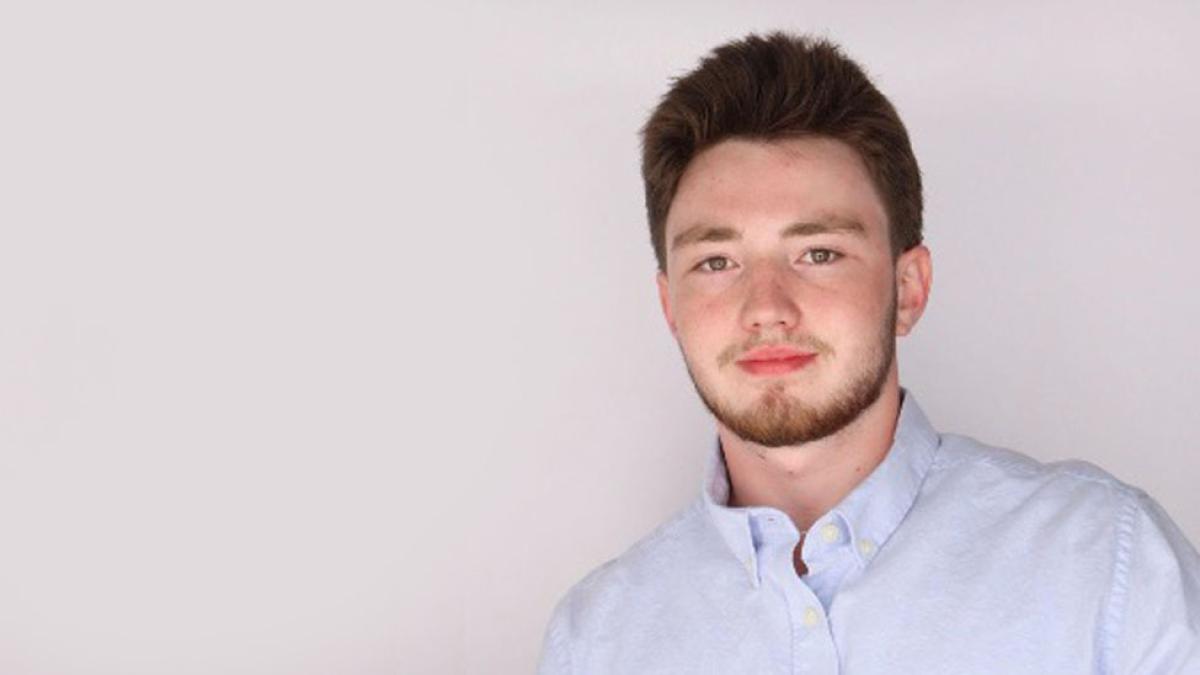
Joe Esner
Audit and Assurance Associate, Deloitte
Class of 2024
BBA/MBA in Public Accounting
Internship: Audit and Assurance Discovery Intern, Deloitte
Pronouns: He/Him
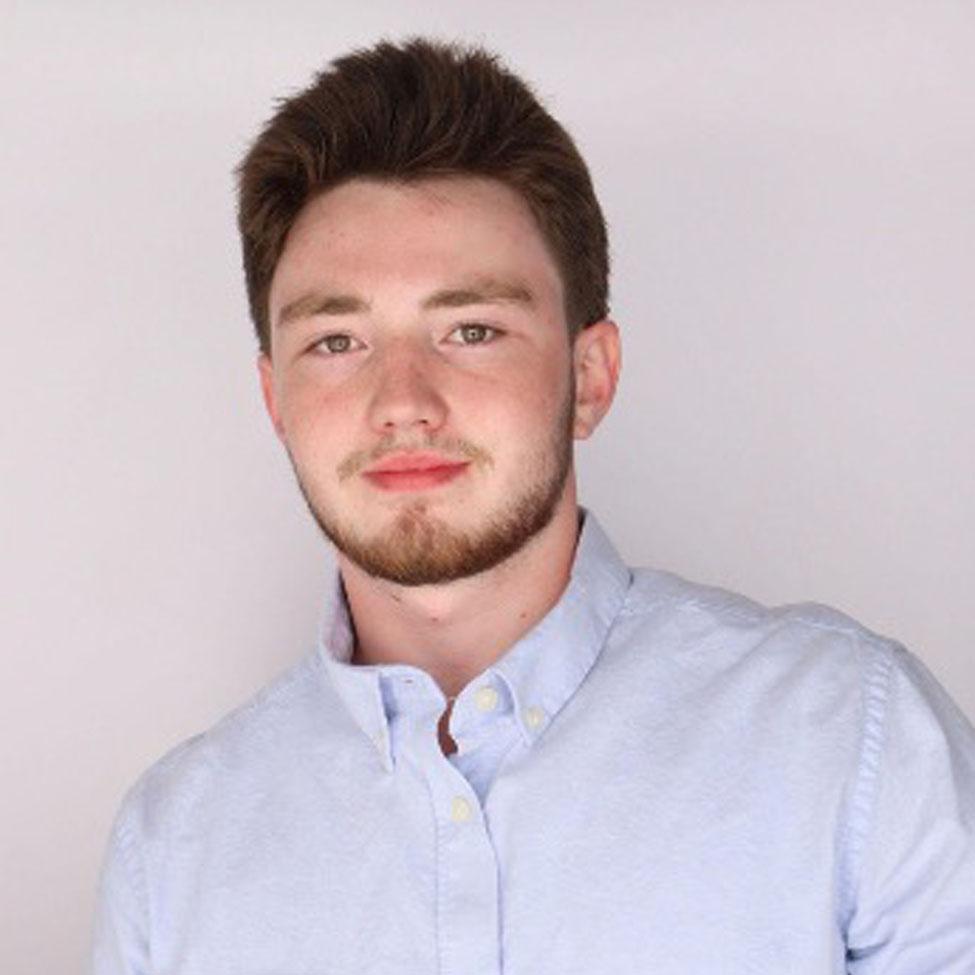
Joe Esner is all about finding and capitalizing on opportunities to make his dreams come true. When he saw the opportunity to apply for an internship with Deloitte, he capitalized on it by taking advantage of the Lubin School of Business's resources to eventually land the position. He is also one of just 250 students nationwide selected to receive a prestigious scholarship. Joe's advice to other Public Accounting majors at Lubin? Don't wait to work towards your dreams.
How has the Lubin School of Business helped you prepare for your current internship?
The Lubin School of Business has helped me realize that there are opportunities out there and that your dreams can come true when you capitalize on those opportunities. Lubin has helped shape me into a professional through developmental classes and strong business connections. Lubin has opened me to connections that I wouldn't have been able to achieve without being a Pace University student. I have gained a lot of experience from leadership roles to student employment opportunities and Lubin helped me formulate these experiences into a professional resume, which helped get my foot in the door at my internship.
Lubin has opened me to connections that I wouldn't have been able to achieve without being a Pace University student. I have gained a lot of experience from leadership roles to student employment opportunities and Lubin helped me formulate these experiences into a professional resume, which helped get my foot in the door at my internship.
What attracted you to this internship?
Deloitte, being the largest financial services company in the world and a Big Four accounting firm, holds high prestige. The opportunities at Deloitte are huge, and being surrounded by so many business professionals has helped me learn and grow into the person I am.
Describe what a typical day looks like as an intern at Deloitte.
My day typically starts at 9:00 a.m. I log on, check my emails, and get organized for the day. After getting situated, I conduct a meeting with my team to discuss the agenda for the day. Then we begin working on assigned projects and any client engagements there may be. Before I know it, 5:00 p.m. is near, and the day is over. During the first two weeks of my internship, my team and I worked on a cross business case simulation where we consulted on a client merger and acquisition. The rest of the internship is real business exposure through client assignments and business specific projects.
What has been the highlight or most enjoyable aspect of your internship so far?
I was flown out to Texas to attend an intern conference at what is called 'Deloitte University,' which is basically a five-star professional resort with all-inclusive food and activities. It was a great experience and a super fun opportunity to network and meet fellow interns.
How has this experience shaped or impacted your career goals?
This internship is the steppingstone to securing a great career in accounting. The opportunity to learn from so many different business professionals across the country is really making an impact on where I want to be in the future. Hearing and seeing so many success stories firsthand really motivates me to push further and keep striving for more.
How will this experience impact your next semester at Lubin?
This experience showcases my hard work and ability to accomplish anything, even when hardships are thrown my way. My next semester will be more focused on learning and retaining information from my major courses, rather than worrying about securing my next internship. I will soon be preparing for the Certified Public Accountant (CPA) exam, so my classes are super important to me.
You are one of only 250 students nationwide to be named as a Public Company Accounting Oversight Board (PCAOB) Scholar for the 2022–2023 academic year. What does this achievement mean to you? What motivates you to work hard?
Being a recipient of the PCAOB scholarship is one of my greatest academic achievements. It showcases my hard work and dedication to learning in the accounting field. It motivates me because it highlights the fact that others notice my diligence, including peers, professors, and family. This award is proof that I am heading in the right direction and that my work does not go unseen. I stay motivated by surrounding myself with successful people who give off positive energy and enthusiasm. I am beyond grateful to have received this award and it only further motivates me to keep striving for more. Greatness is near and I couldn't have done it without the help of my Pace professors and friends.
Do you have any advice for other Lubin students who would like to pursue an internship in the future?
My advice would be to get involved and take advantage of any opportunity you see because Pace and Lubin are full of them. There are so many student organizations and positions to take on in order develop your leadership and professional skills. Start the search for internships as soon as possible, especially as an accounting major, because the firms recruit early.
Connect With Joe:
Why the WHO finally declared monkeypox a global public health emergency
For starters, said Ana B. Amaya, an expert in global health governance at Pace University in New York, this monkeypox outbreak is just very different from past outbreaks of the disease. The vast majority of the latest cases have been identified among gay and bisexual men, and sexual contact with multiple sexual partners has emerged as an important risk factor. Scientists are now trying to determine if the virus spreads through sexual fluids like semen and vaginal fluid in addition to the ways it’s already known to spread: via skin-to-skin contact and, to a lesser degree, by respiratory transmission.


